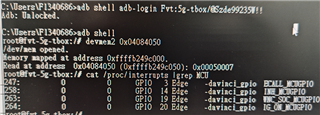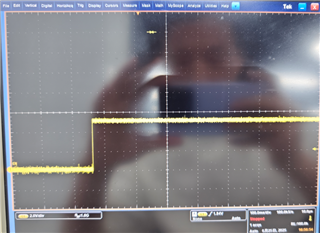Tool/software:
Dear Expert.
Customer follow this link to test MCU GPIO wakeup from "deep sleep" or "MCU only" mode.
-> 3.3.5.4. Deep Sleep
-> 3.3.5.5. MCU Only
Both of them use same linux device tree code. (k3-am62x-sk-lpm-wkup-sources.dtso)
wake up gpio are MCU_GPIO0_19 / MCU_GPIO0_20 / MCU_GPIO0_3 / MCU_GPIO0_14
all of these gpio has Raising and Failing edge wakeup trigger issue even software setting "Failing trigger edge" only.
Here is device tree,
// SPDX-License-Identifier: GPL-2.0
/**
* AM62 family of devices can wakeup from Low Power Modes via
* multiple wakeup sources. This overlay enables MAIN GPIO, MCU GPIO,
* and MCU MCAN pins.
*
* Copyright (C) 2023 Texas Instruments Incorporated - http://www.ti.com/
*/
/dts-v1/;
/plugin/;
#include <dt-bindings/input/input.h>
#include <dt-bindings/gpio/gpio.h>
#include <dt-bindings/interrupt-controller/irq.h>
#include <dt-bindings/interrupt-controller/arm-gic.h>
#include "k3-pinctrl.h"
&{/} {
gpio_key {
compatible = "gpio-keys";
autorepeat;
pinctrl-names = "default";
pinctrl-0 = <&main_gpio1_pins_default>;
//switch {
// label = "CAN1_INH_WKGPIO";
// linux,code = <KEY_WAKEUP>;
// interrupts-extended = <&main_gpio0 4 IRQ_TYPE_LEVEL_LOW>,
// <&main_pmx0 0x010>;
// interrupt-names = "irq", "wakeup";
//};
//
//switch1 {
// label = "CAN0_INH_WKGPIO";
// linux,code = <144>;
// interrupts-extended = <&main_gpio0 5 IRQ_TYPE_LEVEL_LOW>,
// <&main_pmx0 0x014>;
// interrupt-names = "irq", "wakeup";
//};
};
mcu_gpio_key {
compatible = "gpio-keys";
autorepeat;
pinctrl-names = "default";
pinctrl-0 = <&wake_mcugpio1_pins_default>;
interrupt-parent = <&mcu_gpio0>;
interrupts = <19 IRQ_TYPE_EDGE_FALLING>,
<20 IRQ_TYPE_EDGE_FALLING>,
<3 IRQ_TYPE_EDGE_FALLING>,
<14 IRQ_TYPE_EDGE_FALLING>;
switch {
label = "WNC_SOC_MCUGPIO";
linux,code = <143>;
gpios = <&mcu_gpio0 19 GPIO_ACTIVE_LOW>;
wakeup-source;
};
//mark test this
switch1 {
label = "IG_ON_MCUGPIO";
linux,code = <144>;
gpios = <&mcu_gpio0 20 GPIO_ACTIVE_LOW>;
wakeup-source;
};
switch2 {
label = "ECALL_MCUGPIO";
linux,code = <145>;
gpios = <&mcu_gpio0 3 GPIO_ACTIVE_LOW>;
wakeup-source;
};
switch3 {
label = "INH_MCUGPIO";
linux,code = <146>;
gpios = <&mcu_gpio0 14 GPIO_ACTIVE_LOW>;
wakeup-source;
};
};
};
&main_pmx0 {
main_gpio1_pins_default: main-gpio1-pins-default {
pinctrl-single,pins = <
//AM62X_IOPAD(0x010, 0x28054187, 7) /* (G17) OSPI0_D1.GPIO0_4 */
//AM62X_IOPAD(0x014, 0x28054187, 7) /* (F21) OSPI0_D2.GPIO0_5 */
>;
};
};
&mcu_pmx0 {
wake_mcugpio1_pins_default: wake-mcugpio1-pins-default {
pinctrl-single,pins = <
AM62X_MCU_IOPAD(0x0050, PIN_INPUT , 7) /* (A9) WKUP_I2C0_SDA.MCU_GPIO0_20 */
AM62X_MCU_IOPAD(0x004C, PIN_INPUT , 7) /* (E9) WKUP_I2C0_SCL.MCU_GPIO0_19 */
AM62X_MCU_IOPAD(0X000C, PIN_INPUT , 7) /* (E8) MCU_SPI0_D0.MCU_GPIO0_3 */
AM62X_MCU_IOPAD(0x0038, PIN_INPUT , 7) /* (E8) MCU_SPI0_D0.MCU_GPIO0_14 */
>;
};
mcu_mcan0_tx_pins_default: mcu-mcan0-tx-pins-default {
pinctrl-single,pins = <
AM62X_IOPAD(0x034, PIN_OUTPUT, 0) /* (D6) MCU_MCAN0_TX */
>;
};
mcu_mcan0_rx_pins_default: mcu-mcan0-rx-pins-default {
pinctrl-single,pins = <
AM62X_IOPAD(0x038, PIN_INPUT, 0) /* (B3) MCU_MCAN0_RX */
>;
};
mcu_mcan0_rx_pins_wakeup: mcu-mcan0-rx-pins-wakeup {
pinctrl-single,pins = <
AM62X_IOPAD(0x038, PIN_INPUT | WKUP_EN, 0) /* (B3) MCU_MCAN0_RX */
>;
};
mcu_mcan1_tx_pins_default: mcu-mcan1-tx-pins-default {
pinctrl-single,pins = <
AM62X_IOPAD(0x03c, PIN_OUTPUT, 0) /* (E5) MCU_MCAN1_TX */
>;
};
mcu_mcan1_rx_pins_default: mcu-mcan1-rx-pins-default {
pinctrl-single,pins = <
AM62X_IOPAD(0x040, PIN_INPUT, 0) /* (D4) MCU_MCAN1_RX */
>;
};
mcu_mcan1_rx_pins_wakeup: mcu-mcan1-rx-pins-wakeup {
pinctrl-single,pins = <
AM62X_IOPAD(0x040, PIN_INPUT | WKUP_EN, 0) /* (D4) MCU_MCAN1_RX */
>;
};
mcu_uart0_pins_default: mcu-uart0-pins-default {
pinctrl-single,pins = <
AM62X_MCU_IOPAD(0x001c, PIN_INPUT, 0) /* MCU_UART0_CTSn */
AM62X_MCU_IOPAD(0x0020, PIN_OUTPUT, 0) /* MCU_UART0_RTSn */
AM62X_MCU_IOPAD(0x0018, PIN_OUTPUT, 0) /* MCU_UART0_TXD */
>;
};
mcu_uart0_rxd_pins_default: mcu-uart0-rxd-pins-default {
pinctrl-single,pins = <
AM62X_MCU_IOPAD(0x0014, PIN_INPUT, 0) /* MCU_UART0_RXD */
>;
};
mcu_uart0_rxd_pins_wakeup: mcu-uart0-rxd-pins-wakeup {
pinctrl-single,pins = <
AM62X_MCU_IOPAD(0x0014, PIN_INPUT | WKUP_EN, 0) /* MCU_UART0_RXD */
>;
};
};
&mcu_gpio0 {
status = "okay";
};
&mcu_gpio_intr {
status = "okay";
};
&mcu_mcan0 {
pinctrl-names = "default", "wakeup";
pinctrl-0 = <&mcu_mcan0_tx_pins_default>, <&mcu_mcan0_rx_pins_default>;
pinctrl-1 = <&mcu_mcan0_tx_pins_default>, <&mcu_mcan0_rx_pins_wakeup>;
status = "disabled";
};
&mcu_mcan1 {
pinctrl-names = "default", "wakeup";
pinctrl-0 = <&mcu_mcan1_tx_pins_default>, <&mcu_mcan1_rx_pins_default>;
pinctrl-1 = <&mcu_mcan1_tx_pins_default>, <&mcu_mcan1_rx_pins_wakeup>;
status = "disabled";
};
&mcu_uart0 {
pinctrl-names = "default", "wakeup";
pinctrl-0 = <&mcu_uart0_pins_default>, <&mcu_uart0_rxd_pins_default>;
pinctrl-1 = <&mcu_uart0_pins_default>, <&mcu_uart0_rxd_pins_wakeup>;
status = "disabled";
};
We use MCU_GPIO0_20 as example.
I think pinmux is ok.


we let gpio keep low in init state, and then trigger high (Raising edge), it trigger wakeup event even software setting Failing edge.
We can see that is no bounce problems.

And then, we let gpio keep HIGH in init state, and then trigger LOW (falling edge), it trigger wakeup event.
We can also see that is no bounce problems.

SW : 10.0, we set wakup source only in Linux side.
Do I miss any thing?
Thank You Very Much
Gibbs

